Help us improve our information
We need your help to improve our information to better support people with Crohn’s and Colitis. Fill in our short survey to let us know what we're doing well and how we can better meet your needs.
Last full review: April 2023
Next review date: April 2026
This information is for people with Colitis or Crohn’s who are taking 5-ASAs. It is also for anyone who is thinking about starting treatment with 5-ASAs. You may also hear 5-ASAs called aminosalicylates. This information can help you decide if 5-ASAs are right for you. It looks at:
This information might use words you have not heard before. Our page on medical words can help provide an explanation.
This information is about 5-ASAs in general. It should not replace advice from your IBD team.

We need your help to improve our information to better support people with Crohn’s and Colitis. Fill in our short survey to let us know what we're doing well and how we can better meet your needs.
You may also hear 5-ASAs called aminosalicylates.
There are four different 5-ASAs available:
Remember that medicines often have two names – a scientific name and a brand name. If you are not sure about which medicine you have, ask someone from your IBD team to explain. Some 5-ASAs also come in different forms (formulations). Each one targets a different part of your gut.
Mesalazine (brand names include Asacol, Zintasa, Octasa, Pentasa, Salofalk and Mezavant)
Olsalazine (brand name Dipentum)
Olsalazine comes in the form of a tablet or capsule, which you swallow with water. The medicine releases in your colon.
Balsalazide (brand name Colazide)
Balsalazide comes as a capsule which you swallow with water. The medicine releases in your colon.
Sulfasalazine (brand name Salazopyrin)
Sulfasalazine comes in the form of a tablet or liquid which you swallow with water. You can also have suppositories which you insert in your bottom.
When your symptoms get worse, known as a flare-up, your gut wall can become inflamed and irritated. 5-ASAs reduce inflammation in your bowel. Reducing inflammation allows damaged tissue in your bowel to heal and repair itself. This will help to reduce symptoms caused during a flare-up.
If you have Colitis your IBD team might suggest a 5-ASA:
If you have Crohn’s, 5-ASAs are not commonly prescribed. Your IBD team may suggest a 5-ASA:
If you are not sure if 5-ASAs are suitable for you, talk to your IBD team. They will be able to talk you through your options and help you decide.
Pentasa, alongside Humira, has really helped me get into remission and stay there after a long time of my symptoms being out of control.
Emily
Living with Colitis
There are lots of things to think about when you start a new treatment. Your IBD team will discuss your options with you. When thinking about a new treatment you might want to consider the potential benefits, possible risks and the goals of your treatment. Some things to think about include:
Our Appointment guide has a list of questions you might want to ask. It can help you focus on what matters most to you. You might find our information about other medicines and surgery for Colitis helpful.
Use this tool to understand more about potential treatment options that suit your needs. The tool is designed to help you:
All 5-ASAs work in slightly different ways, including the parts of the gut that they target. Your doctor may suggest a certain type or brand of 5-ASA, depending on where you have inflammation.
If you find a type or brand of 5-ASA which works well for you, you may keep taking it long-term. If your condition changes or you start experiencing symptoms, talk to your IBD team. You may need to switch your treatment.
Sometimes, there may be supply issues with certain brands. This may mean you have to switch to a different treatment or brand. If this happens, your IBD team will talk to you about the different options available.
Write down any symptoms you have and always tell your IBD team about them. This is particularly important if you have recently switched to a new treatment.
At first, the aim of treatment is to reduce the inflammation in your gut and get your symptoms under control (remission). This is called induction treatment. Once your symptoms are under control, treatment aims to keep it under control. This is called maintenance treatment.
Find out more about how we talk about the effectiveness of medicines.
5-ASAs work well at getting and keeping symptoms under control in people with Colitis. But they do not always work for everyone – what is right for one person, may not be right for someone else.
A review of studies looked at how well 5-ASAs can get symptoms of Colitis into remission. The review combined data from studies that compared 5-ASAs with a dummy treatment (placebo). The 5-ASAs in these studies were given by mouth. The review found that 5-ASAs worked better than placebo to get Colitis under control.

After 6 to 12 weeks, more people had their Colitis under control (in remission) after taking a 5-ASA compared with people who had not been taking a 5-ASA (placebo). About 29% (29 in every 100 people) who took a 5-ASA had their Colitis in remission compared with 17% (17 in every 100 people) who took placebo.
Two reviews have looked at how well 5-ASAs keep symptoms under control in people with Colitis. These reviews combined data from studies that compared 5-ASAs with a dummy treatment (placebo). One looked at rectal 5-ASAs, which you insert into your bottom. The other looked at oral 5-ASAs, which you take by mouth. The reviews found that 5-ASAs worked better than placebo to keep Colitis under control.
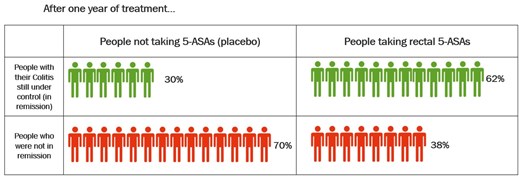
After 1 year, more people had their Colitis in remission after taking a rectal 5-ASA compared with people who had been taking placebo. About 62% (62 in every 100 people) who took a rectal 5-ASA had their Colitis in remission compared with 30% (30 in every 100 people) who took placebo.
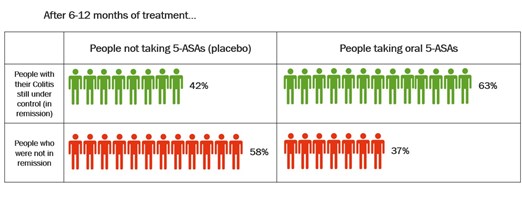
After 6 to 12 months, more people had their Colitis in remission after taking an oral 5-ASA compared with people who had been taking placebo. About 63% (63 in every 100 people) who took an oral 5-ASA had their Colitis in remission compared with 42% (42 in every 100 people) who took placebo.
A review of studies looked at how well 5-ASAs can get symptoms of Crohn’s into remission. The review combined data from studies that compared 5-ASAs with a dummy treatment (placebo). It found that sulfasalazine provides a small benefit for people with mild to moderate Crohn’s. But sulfasalazine did not work as well as steroids. Mesalazine was not effective for inducing remission in active Crohn's.
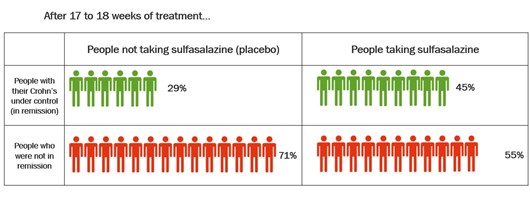
After 17 to 18 weeks, more people had their Crohn’s in remission after taking sulfasalazine compared with people who had been taking placebo. About 45% (45 in every 100 people) who took sulfasalazine had their Crohn’s in remission compared with 29% (29 in every 100 people) who took placebo.
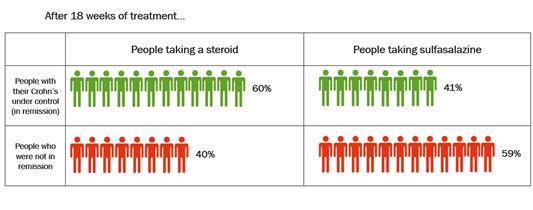
After 18 weeks, more people had their Crohn’s in remission after taking a steroid compared with people who had been taking sulfasalazine. About 60% (60 in every 100 people) who took a steroid had their Crohn’s in remission compared with 41% (41 in every 100 people) who took sulfasalazine.
A review looked at how well 5-ASAs keep symptoms under control in people with Crohn’s who had received medicines to get their symptoms under control (in remission). This review combined data from studies that compared 5-ASAs with a dummy treatment (placebo). It found that 5-ASAs were no more effective than placebo for maintaining remission achieved by medical treatment.
Some people with Crohn's will need surgery to get them into remission. A review looked at how well 5-ASAs keep symptoms under control in people with Crohn’s who had surgery to induce remission. This review combined data from studies that compared 5-ASAs with a dummy treatment (placebo). It found that 5-ASAs were slightly more effective than placebo for maintaining remission in people with Crohn’s.
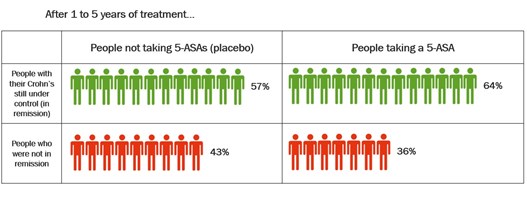
After up to 5 years of treatment, slightly more people continued to be in remission after taking a 5-ASA compared with people who had been taking placebo. About 64% (64 in every 100 people) who took a 5-ASA continued to be in remission compared with 57% (57 in every 100 people) who took placebo.
Everyone responds differently to a new medicine. For most people, 5-ASAs take up to four weeks to start working.
Some types of 5-ASAs, such as sulfasalazine, should take only a few days to start working.
You’ll usually keep taking 5-ASAs for as long as they are working well.
5-ASAs come in different forms, including:
Which type of 5-ASA you have, and the dose, depends on how much of your gut is affected by your Crohn’s or Colitis.
You may have one form of 5-ASA at a time, or a combination, depending on your situation. Some people find that using an oral medicine, combined with a rectal treatment, works well for them. There is research which shows that using a combination of 5-ASAs, is better than using one on its own.
Your doctor may suggest that you try different combinations of 5-ASAs until you find something that works well for you.
Many brands of 5-ASAs have a special coating around the tablets. This allows the medicine to release in the right part of the gut. It is important to not chew, cut or crush the tablets, as this could destroy the coating. This could stop the medicine releasing in the right area of your gut. You can cut, but not crush, some brands of tablet such as Pentasa. Always check the leaflet which comes with your medicine.
You take granules by placing them on your tongue and swallowing with plenty of water. If you find granules difficult to swallow with water, try swallowing them with soft food such as yoghurt. You do not need to chew granules. They are a good option for people who cannot swallow tablets or capsules easily.
Rectal 5-ASAs, which you insert into your bottom, can treat the lower parts of your large bowel. These areas are harder to treat with oral medicines.
Suppositories are small, waxy, bullet-shaped capsules that you insert into your bottom yourself. They dissolve at body temperature. Suppositories often work well because they can target the affected area straight away. They are also less likely to cause side effects.
Enemas come in different forms including liquid or foam. You insert them into the rectum through your bottom, using an applicator.
Foam enemas are often easier to use than liquid enemas, especially if your gut is very sensitive. Liquid enemas can usually travel further along your colon. This helps the medicine reach more of the inflammation.
Using suppositories and enemas is not usually painful. But some people may find them uncomfortable. It’s normal to find them difficult to use at first, especially if you have never used them before. But try to stick with your medicine and keep trying. Talk to your IBD team if you’re struggling to use suppositories or enemas. They will be able to support you.
At first, the suppositories were very difficult to use as it felt uncomfortable and embarrassing to me, but after a while, I found that it became just another part of my bedtime routine. I find that taking Pentasa granules also helps as they can be swallowed quickly.
Emily
Living with Colitis
Your doctor will decide which dose you need. It usually depends on which brand of 5-ASA you are taking, as well as how active your condition is. The dose may increase or decrease depending on how you respond. Your IBD team may also change your dose if your condition changes over time.
Unless otherwise instructed by your doctor, typical doses to treat a flare-up are:
Oral 5-ASAs are often prescribed in two or three doses during the day. But evidence shows that taking these together, in a bigger daily dose, can work just as well. There are some once-a-day brands available. This means you would only need to take one dose each day.
During a flare-up, your dose may have to change to help you manage the symptoms. At other times, you will usually stay on a maintenance dose. This will help to keep your condition under control. This dose may be slightly lower than the dose you started with.
Check with your IBD team if you are not sure about the dose you should be taking.
If you forget to take a dose, take it as soon as you remember. If it is nearly time for your next dose, wait until then and continue as before. Do not take a double dose. See the information leaflet that comes with your medicine for more details.
You will probably take 5-ASAs long-term. This is to keep your condition under control and to reduce the risk of flare-ups. If you respond well to 5-ASAs you should be able to keep taking them for years. Taking 5-ASAs even when you are feeling well is likely to be the most effective way to prevent a flare-up.
Your IBD team may suggest that you keep taking 5-ASAs long-term, to lower your risk of getting bowel cancer. There is some evidence which shows that 5-ASAs can reduce the risk of bowel cancer in people with IBD. See our information on bowel cancer risk or talk to your IBD team if you're concerned about your risk of bowel cancer.
Find out more about long-term treatment for Crohn’s and Colitis in our information on Taking Medicines.
There are different types of 5-ASAs, which come in different forms. If one does not work well, you may be able to try a different type or form, either on its own or in combination.
If 5-ASAs are not suitable for you, or you have severe side effects, your doctor may prescribe steroids. They can help you manage flare-ups. These may take a few weeks to start working and you may experience side effects from them too. Talk to your IBD team about whether they are suitable for you.
Other common treatments for Crohn’s and Colitis include immunosuppressants such as azathioprine, mercaptopurine or methotrexate. Or your doctor may offer you biologic medicines (such as adalimumab, golimumab, infliximab, ustekinumab and vedolizumab). If you have Colitis, JAK inhibitors (such as filgotinib or tofacitinib) may be an option.
There are a few reasons why you or your IBD team might think about stopping or changing your treatment.
Always talk to your IBD team if you are thinking about stopping or changing your treatment. They will be able to talk to you about what options are available.
You will usually need some tests to check if 5-ASAs are suitable for you. Before starting treatment, your IBD team should test your blood and pee. These tests are to check your blood and to see how well your kidneys, and liver are working.
You will usually have regular blood and pee tests while on 5-ASA treatment. This is to check for any side effects and monitor how well your medicine is working.
Your doctor may suggest having a blood test after 3 months of starting treatment, then once or twice a year after that. This is to make sure that your kidneys are still working properly. If you are taking sulfasalazine you may need blood tests more often.
5-ASAs may not be suitable for everyone. Your doctor or nurse may not offer you 5-ASAs if any of the following applies to you:
You may still be offered 5-ASAs if you have any of the above health conditions. But, your doctor may adjust the dose to suit you better. If you have any of the above health conditions, or you are not sure if 5-ASAs are suitable for you, talk to your IBD team.
Like all medicines, 5-ASAs can have side effects, although not everyone will get them. If you do get side effects, they’re usually quite mild and you can manage them well.
Common side effects (between 1 in 10 and 1 in 100 people) include:
Less common side effects (up to 1 in 1000 people) include:
The treatment which you are taking may also have its own side effects. Read the information leaflet which comes with your medicine or talk to your doctor.
Rarely, 5-ASAs can cause problems with your kidneys, liver, lungs and pancreas.
Call 999 or emergency medical help if you develop:
Your doctor should talk through the risks and benefits before you start 5-ASAs. Let your doctor or IBD nurse know about any new symptoms you develop, whenever they occur.
This is not a full list of side effects. For more information see the Patient Information Leaflet provided with your medicine or visit medicines.org.uk/emc/.
I have taken mesalazine for 24 years and have not felt any significant side effects throughout this time. Taking it has just become part of my daily routine.
Shirley
Living with Colitis
You can usually take most other medicines safely with 5-ASAs. But always check with your IBD team, doctor or pharmacist if you are taking or plan to take any other medicines while you are taking 5-ASAs. This includes:
Read our information on Taking Medicines to find out more.
Alcohol is not known to have any interaction with 5-ASAs. To keep the health risks from drinking alcohol low it is best to stay within the recommended limits.
It’s safe to have vaccinations whilst on 5-ASAs. This includes the annual flu jab and COVID-19 vaccines and boosters.
Before having a vaccine, you should check with your IBD team that it’s suitable for you. This is particularly important if you are also taking other medicines for your IBD.
Most 5-ASAs do not affect fertility. However, there are some that may affect your chances of conceiving if you have male reproductive organs:
5-ASAs do not seem to affect fertility in people with female reproductive organs.
If you have concerns about your fertility, or you are trying to get pregnant, speak to your IBD team. You can also read more about fertility in our information on Reproductive health.
5-ASAs are mostly considered safe to take while pregnant.
However, balsalazide is not recommended during pregnancy. This is because there is not enough research to show if balsalazide is safe to take while pregnant.
If you take sulfasalazine while you are pregnant, you may need to take a regular high-dose folic acid supplement.
5-ASAs are mostly considered safe to take while breastfeeding.
If you are breastfeeding while taking 5-ASAs, your baby may experience some diarrhoea. This usually settles once you stop taking 5-ASAs. It can also improve if the baby starts bottle feeding with formula milk. You might want to discuss what’s best for you and your baby with your baby’s healthcare team.
See our information on Pregnancy and breastfeeding for more details.
Taking medicines and managing side effects can be difficult – we understand and we’re here to help. Our Helpline can answer general questions about treatment options. It can also help you find support from others with the conditions.
Your IBD team are also there to help. You can talk to them about your dosage, how they’ll be monitoring you and what alternatives may be available. You should also get in touch with your IBD team if you have any new symptoms or side effects.
It can take time to find the medicine that’s right for you. Don’t be afraid to ask questions and seek out extra support when you need it.
This information is general and doesn’t replace specific advice from your health professional. Talk to your doctor or IBD team for more information.
We follow strict processes to make sure our information is based on up-to-date evidence and easy to understand.
Please email us at evidence@crohnsandcolitis.org.uk if:
You can also write to us at Crohn’s & Colitis UK, 1 Bishop Square, Hatfield, AL10 9NE, or contact us through our Helpline: 0300 222 5700
Treatments
Read information
Treatments
Read information
We know it can be difficult to live with, or support someone living with these conditions. But you’re not alone. We provide up-to-date, evidence-based information and can support you to live well with Crohn’s or Colitis.
Our helpline team can help by:
Providing information about Crohn’s and Colitis.
Listening and talking through your situation.
Helping you to find support from others in the Crohn’s and Colitis community.
Providing details of other specialist organisations.
Please be aware we’re not medically or legally trained. We cannot provide detailed financial or benefits advice or specialist emotional support.
Please contact us via telephone, email or LiveChat - 9am to 5pm, Monday to Friday (except English bank holidays).
If you need specific medical advice about your condition, your GP or IBD team will be best placed to help.
Would you like to save the changes made to this page?
Your details were successfully saved.
